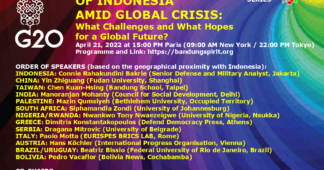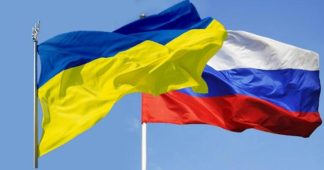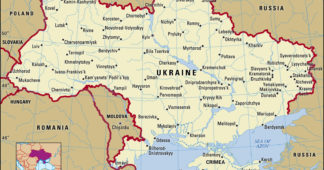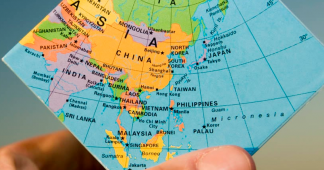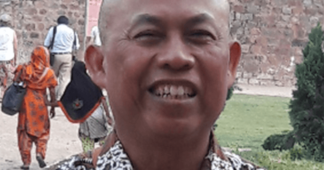BANDUNG SPIRIT ONLINE CONVERSATION SERIES
G20 PRESIDENCY OF INDONESIA AMID GLOBAL CRISIS:
What challenges and what hopes for a global future?
April 21, 2022 at 15:00 PM Paris Time
(09:00 AM Montreal/New York/Cochabamba/Havana = 10:00 AM Rio de Janeiro = 13:00 Dakar/Rabat = 15:00 PM Rome/Budapest/Vienna/Belgrade/Johannesburg = 16:00 PM Moscow/Athens/Palestine = 18:30 PM Delhi = 18:45 PM Kathmandu = 20:00 PM Jakarta/Bandung/Surabaya = 21:00 PM Bali/Beijing/Shanghai/Taipei = 22:00 PM Seoul/Tokyo).
The G20 Summit will take place at the end of October 2022 in Indonesia amid global crisis. The watchwords are “RECOVER TOGETHER, RECOVER STRONGER”. Indonesia proposed to focus on three main pillars: GLOBAL HEALTH ARCHITECTURE, SUSTAINABLE ENERGY TRANSITION, DIGITAL TRANSFORMATION. Through these pillars, Indonesia is committed to take the lead on ensuring equitable access to COVID-19 vaccines, promoting sustainable and inclusive economic development through MSMEs participation and digital economy. However, the global crisis provoked by the Covid-19 pandemic was aggravated and prolonged by the Russian military attacks on Ukraine, and the G20 risks to be dragged into geopolitical battle between world power blocs.
This raises questions:
1) What are the global challenges seen from different countries and perspectives?
2) What common request / message / recommendation (from Bandung Spirit Community) to be addressed to Indonesia as president of G20?
The issue is particularly crucial and unique for the global community and for Indonesia due to the multiple positions of Indonesia: initiator and host of Bandung Conference; co-initiator of Belgrade Non Alignement Conference; its geographical position between China and India, between Indian Ocean and Pacific Ocean; its geopolitical position between the West and China; its “eclectic” economic system combining elements of capitalism and socialism; its economic category as new “emerging” forces E7 (China, Brazil, India, Indonesia, Mexico, Russia, Turkey) in front of the old “established” forces G7 (Canada, France, Germany, Italy, Japan, UK, US); its belonging to Asia, Indian Ocean, Pacific Ocean, Developing Countries, Global South, Muslim World; a home to more than 500 ethnic groups and diverse religious/spiritual communities (Buddhism, Christianity, Confucianism, Hinduism, Islam and hundreds of local beliefs) spread on more than 17000 islands.
Will Indonesia be able to defend its sovereignty and promote Bandung – NAM principles (especially under the pressure of the West that tries to use the G20 Summit as a geopolitical tool against Russia and the threat of certain Western countries to boycott the summit if Indonesia welcomes Russia and does not invite Ukraine)?
ORDER OF SPEAKERS (based on the geographical proximity with Indonesia):
INDONESIA: Connie Rahakundini Bakrie (Doctor, Defense and Security Studies,
Senior Defence and Military Analyst, Jakarta)
CHINA: Yin Zhiguang (Professor, Doctor, International Relations, School of Public Affairs and International Affairs, Fudan University, Shanghai)
TAIWAN: Chen Kuan-Hsing (Professor, Doctor, Literary and Cultural Studies, National Chiao Tung University, Bandung School, Taipei) (to be confirmed)
INDIA: Manoranjan Mohanty (Emeritus Professor, Doctor, Political Sciences, Chinese Studies, Council for Social Development, New Delhi)
PALESTINE: Mazin Qumsiyeh (Professor, Doctor, Biology, Palestine Museum of Natural History, Palestine Institute of Biodiversity and Sustainability, Bethlehem University, Occupied Territory)
SOUTH AFRICA: Siphamandla Zondi (Professor, Doctor, Political Sciences, International Relations, University of Johannesburg)
NIGERIA/RWANDA: Nwankwo Tony Nwaezeigwe (Professor, Doctor, Transnational History, African Studies, Institute of African Studies, University of Nigeria, Nsukka)
GREECE: Dimitris Konstantakopoulos (Journalist and writer, editor of Defend Democracy Press, former correspondent in Moscow, former advisor of the Greek Prime Minister Andreas Papandreou on East-West Relations and Arms Control, Athens)
SERBIA: Dragana Mitrovic (Professor, Doctor, Political Economy, Chinese Studies, Faculty of Political Sciences, University of Belgrade)
ITALY: Paolo Motta (Architect, Territorial Planner, Researcher, Expert Member EURISPES’ BRICS LAB, Rome)
AUSTRIA: Hans Köchler (Emeritus Professor, Doctor, Philosophy, University of Innsbruck, President of International Progress Organisation, Vienna)
BRAZIL: Beatriz Bissio (Former journalist, Professor, Doctor, History, Political Sciences, International Relations, Federal University of Rio de Janeiro, Brazil)
BOLIVIA: Pedro Vacaflor (Journalist, International Editor at Bolivia News, Analyst and Broadcaster at Radio Panamericana, Cochabamba)
CO-CHAIRS:
Darwis Khudori, Indonesia/France (Professor, Doctor, Architecture, History, Oriental/Asian/Islamic Studies, University Le Havre Normandy, Initiator and Coordinator of Bandung Spirit Network of Scholars and Activists of Social and Solidarity Movements)
Isaac Bazié, Burkina Faso/Canada (Professor, Doctor, Literary, Cultural and African Studies, Université du Québec à Montréal)
THE CONVERSATION IS OPEN TO PUBLIC FOR FREE OF CHARGE. Please, click the following link to join the conversation: https://zoom.us/meeting/register/tJYsdeiqrjksHdF-5bOI_3EiUXbfLQBHPvmW
